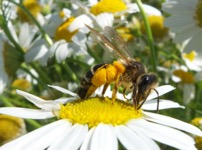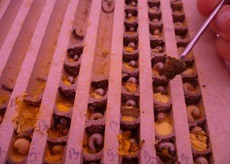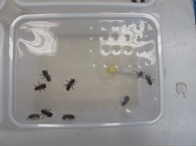In this post, the research group „Community Ecology & Ecotoxicology” offers several topics for RPCs and Master theses.
The research of the group “Community Ecology & Ecotoxicology” which is headed by Dr. Carsten Brühl is concerned with multiple stressors in landscapes and focuses also on the effects of pesticides on biodiversity and communities. Pesticides as well as biocides are considered to have effects that are responsible drivers for changes in terrestrial and aquatic food webs. Amongst other things, we currently researching the effects of common pesticides and agricultural practice on wild bee species and insect pollinators in general.
Research Project Course (RPC) Topic:
Literature review and meta analysis of the pesticide exposure of insect pollinators.
Start: flexible, latest: December 2015
Insect pollinators are at potential risk from pesticide application in agricultural areas. Current European risk assessment does not consider ecological characteristics of terrestrial non-target arthropods for exposure analysis. You will screen literature and available databases for habitat requirements and other relevant traits (e.g. voltinism, flight radius) to categorize the potential exposure of insect pollinators.
Literature review and meta analysis of the pollen diet of wild bee species and their potential exposure.
Start: flexible, latest: December 2015
Bumble bee and solitary bee species use pollen of crops and wild plants to feed their offspring. Therefore, larvae may be exposed to pesticide residue. Your task will be to look up quantitiy and composition that is fed to wild bee larvae in the scientific literature. Furthermore, you will search for pollen residue studies and identify potentially exposed species by combining both information.
Master thesis:
Acute lab toxicity studies with multiple wild bee species
Start: February 2016
Data on interspecific sensitivity of bees is scarce. However, to properly evaluate pesticide impact on bee communities an extensive database is needed. You will conduct acute toxicity experiments with a wide array of bee species to generate median lethal doses (LD50) using the toxic standard dimethoate and the neonicotinoid imidacloprid. Afterwards, you will derive species sensitivity distributions (SSD) for both pesticides.
The technical supervisor for all aforementioned studies will be Philipp Uhl who will also provide you background information, literature and guidance during all tasks.
If you are interested in joining the project team please contact him (uhl@uni-landau.de). Please also don’t hesitate to propose you own research ideas.



